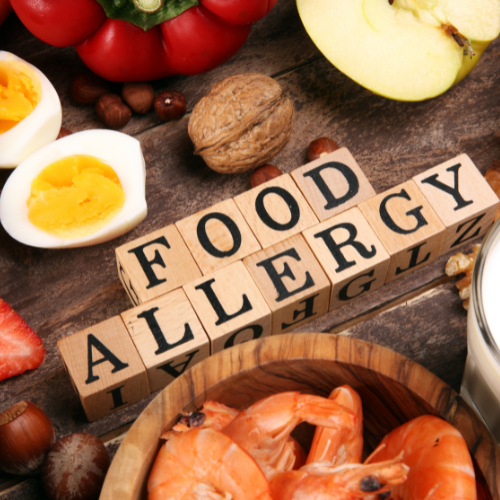Eating solids for the first time is a milestone for babies. But for many parents anxiously weaning their little ones, a worrying question is never far away - what if their babies get allergic to the food they are tasting for the first time?
Allergies in infants are a growing concern, and the way we introduce certain foods can play a crucial role in their immune system development. Here's a guide on how to safely introduce foods that could trigger allergies in babies.
Understanding Food Allergies in Babies
Food allergies occur when the immune system mistakenly identifies a particular food as harmful and reacts to it.
When introducing any new food, it's crucial to remain vigilant for any signs of allergic reactions. While there are over 160 food allergens, some may pose a higher risk of allergies than others. Among these, the following food groups are particularly notorious for potentially triggering allergic reactions.
1. peanuts
2. tree nuts such as walnuts or almonds
3. eggs
4. cow's milk
5. wheat
6. soy
7. fish
8. shellfish
9. sesame
Allergies can range from mild reactions like hives to severe and life-threatening anaphylaxis which is a medical emergency and needs urgent treatment.
Allergic reactions usually happen quickly within a few minutes of exposure to an allergen. It's important to recognize the signs of an allergic reaction, which may include:
- Hives, eczema, or skin rash
- Swelling of the lips, tongue, or face
- Sneezing, runny or blocked nose
- Vomiting or diarrhea
- Coughing or wheezing
- Difficulty breathing
- Pale or blue skin
When to Introduce Food Allergense
Contrary to past advice, current guidelines suggest introducing food allergens early in a baby's diet.
According to NHS UK, around the age of 6 months, you can incorporate these foods into your baby's diet, treating them like any other foods. Once introduced and if well-tolerated, these foods should be included regularly in your baby's diet to reduce the risk of allergies.
Also, a pivotal study in 2015 called Learning Early About Peanut Allergy (LEAP) revealed that introducing peanuts to at-risk babies early on could lower the risk of developing peanut allergies by up to 81%. Put differently, delaying the introduction of peanuts might actually increase the chances of peanut allergies emerging. (Source: https://www.foodallergy.org/resources/learning-early-about-peanut-allergy-leap)
Research indicates that postponing the introduction of peanuts and hen's eggs beyond 6 to 12 months might heighten the likelihood of developing an allergy to these foods.
Steps to Safely Introduce Food Allergens
-
Consult with a GP or Paediatrician: Before introducing any potentially food allergens, consult with your GP or paediatrician, especially if your baby has eczema or a family history of food allergies.
-
Introduce food allergens in the morning The majority of allergic reactions occur within two hours of ingestion, often manifesting within minutes. It's advisable to introduce an allergen shortly after your baby wakes up in the morning or following a morning nap. Introducing the allergen early allows you to monitor your child throughout the day; if an allergic reaction occurs, you'll have ample time to seek guidance from your doctor. For similar reasons, it's preferable to introduce allergens at home and when at least one adult can devote their full attention to the baby for at least two hours afterward, without distractions from other children or household tasks.
-
Start with Single Ingredient Foods: Begin with pureed or mashed versions of the food allergens. For example, offer pureed peanut butter mixed with breast milk or formula. This allows you to monitor your baby for any adverse reactions and identify the specific food causing the allergy if a reaction occurs.
-
Introduce One Food at a Time: Introduce one new food allergen at a time and wait for around 3-5 days before introducing another. This approach helps pinpoint any food that triggers an allergic reaction.
-
Monitor for Reactions: After introducing a new food, closely observe your baby for signs of an allergic reaction. If you notice any symptoms, contact your GP or paediatrician immediately.
-
Gradually Increase Quantity: Begin with tiny portions, like 1/8 teaspoon of finely ground nut mixed into your baby's oatmeal. If your baby tolerates a small amount of the food allergen without any adverse reactions, gradually increase the quantity over the next few days. After confirming the absence of an allergy to that particular food, strive to include it in your baby's diet as often as possible.
-
Consistency is Key: Consistently include food allergens in your baby's diet to maintain tolerance. Aim to offer these foods at least three times a week because that is the median frequency of allergen exposure reported in major studies on food allergy prevention.
-
Be Prepared for Emergencies: In case of a severe allergic reaction, have an emergency action plan in place. This may include administering epinephrine and seeking immediate medical attention.
Foods to Introduce with Caution
While it's important to introduce food allergens early, some foods may require extra caution:
-
Peanuts: Due to their potential for severe allergic reactions, it's recommended to start with smooth peanut butter or powdered peanut butter mixed into purees.
-
Eggs: Begin with well-cooked eggs and avoid raw or lightly cooked eggs, which may increase the risk of allergic reactions.
-
Fish and Shellfish: Introduce these foods gradually and avoid high-mercury fish. Ensure they are thoroughly cooked and de-boned to reduce choking hazards.
-
Cow's Milk: Start with small amounts of plain yogurt or cheese. Avoid giving cow's milk as a primary drink until after the first year.
Introducing food allergens to babies requires careful planning and monitoring. While the guidelines have shifted towards early introduction, it's essential to consult with your GP or paediatrician and follow a systematic approach. By introducing these foods gradually and monitoring for any adverse reactions, parents can help reduce the risk of food allergies in their babies while promoting healthy eating habits.
Remember, every baby is different, and what works for one may not work for another. Trust your instincts as a parent and seek guidance from healthcare professionals when needed. With patience and diligence, you can navigate the introduction of food allergens safely and confidently.

